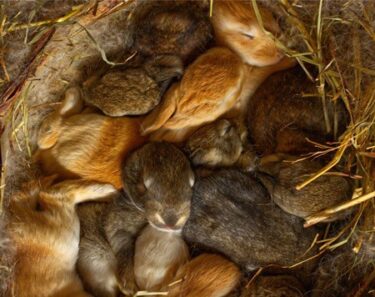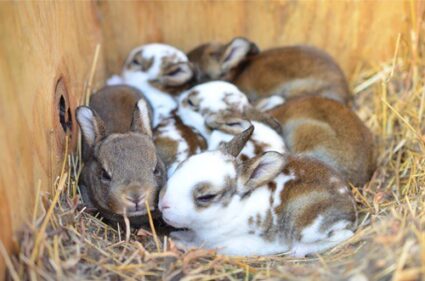Rabbits reach sexual maturity as young as 3 months of age. When this happens, they will seek to breed. This could even be with a parent or sibling, so the kits should be separated to prevent unwanted pregnancies.
According to the University of Miami, a rabbit will give birth to 1-14 kits in her first litter, with the average being 6. It’s unlikely that all of these baby rabbits will survive. A first-time mother may fail to care for her young, so you must ensure that kits are kept warm and well-fed.
The kits will need to live with their mother for approximately 8 weeks. You will then need to separate them from their mother.
How Many Baby Rabbits Survive Out of a Litter?
Some of the kits will be stillborn. If there are stillborns, do not be surprised if your rabbit eats the remains. This is not an act of cannibalism. Your rabbit is taking a safety-first approach. Predators may be attracted by the scent of a stillborn rabbit. If there isn’t a body, there isn’t a scent.
Some babies will be weaker than others. The runt of the litter may not survive. Rabbits are not naturally maternal, so the mother may ignore her weakest young, focusing on feeding and rearing the stronger kits.
Rabbits are instinctively driven to continue their species. If a rabbit feels that she can only keep so many babies alive, she’ll prioritize those that are most likely to survive. Stronger young have a better chance of surviving and eventually breeding themselves.
She may separate her babies into two groups. The strong kits will bed fed and the weak neglected. So, you should check the hutch regularly as a nest of hay and fur will likely hide the babies. The weaker young may be buried deeper in this nest, unable to access milk and warmth.
Do Mother Rabbits Mourn the Loss of Their Babies?
Mother rabbits will not mourn stillborn babies, or those that die shortly after birth. She knows that she can be impregnated again just days later. Rabbits see their kits as essential for the continuation of the species. If pregnancy doesn’t have a successful outcome, she will try again.
However, the mother may be somewhat protective of her surviving kits. Don’t be surprised if she reacts aggressively when you attempt to handle her young, which can make cleaning the hutch more difficult.
My Rabbit is Ignoring Her Babies
The mother won’t cuddle up to her babies. She knows that a predator would consider a nest of helpless baby rabbits easy pickings, so will keep her distance. She will aim to keep any threats away from the nest.
A hutch on your property should be free from such dangers. Instinct overpowers logical thought in animals, so your rabbit will build a nest for her babies and attend to their needs once a day.
A baby rabbit just needs nourishment. Rabbit milk is rich in calories, so her kits only need to be fed once a day. Don’t feed a baby rabbit cows milk. Also, the mother will stimulate her young into eliminating.
Don’t be too concerned if you don’t see this happen as a rabbit will feed her young under the cover of darkness. Just ensure that they are looking healthy. Here’s some advice on how to care for baby rabbits.

What To Do if Baby Rabbits Are Neglected
If you are concerned about the health of your baby rabbits, here are some things that you can do:
- Count the babies: Ensure that all kits are all accounted for. If a baby burrows deeper than the others, it may be forgotten.
- Time in the nest: If the mother leaves her young unattended in the middle of the hutch, you should move them to the nest yourself. Your rabbit may not think to care for babies that wander off.
- Health check: Ensure the babies are warm and have round, plump stomachs. This is a sign that they are being nurtured. If a baby is too cold, she will be unable to feed and will not survive for long.
Warm-up any kits by placing a hot water bottle below the nest. Also, you can also hand-feed baby rabbits using a rabbit milk replacement formula. Here are some of the types of foods that can be fed to baby rabbits.
Can Baby Rabbits Live with Their Father?
Even if you feel that the mother is not caring for her young, you should never house the kits with their father. Males cannot produce any milk, and they have even fewer natural caring instincts. A male will also see his offspring as territorial rivals or even mating partners.
Remove the father from the cage as soon as the mother has given birth. The female will be ready to breed just 24 hours later, and an unneutered male is extremely likely to take this opportunity. You don’t want another litter.
Why is My Rabbit Eating Her Babies?
Aa rabbit may eat her stillborn babies. Sometimes, a rabbit will also eat her living babies. This is especially likely after her first litter. There are several explanations for this behavior:
- Confusion: She did not realize that these were her young, mistaking the babies for the afterbirth.
- Physical weakness: Your rabbit was left weak due to the birth and sought an energy source. Offer plenty of alfalfa hay to a pregnant rabbit to minimize the risk of this happening.
- Stress and anxiety: The birth deeply stressed your rabbit.
A rabbit eating her young is most likely to happen after her first litter. It’s a new experience for her. If a rabbit continues to eat her young after a second or third pregnancy, you should cease breeding her.
My Rabbit Still Hasn’t Had Her Litter
In this instance, it means your rabbit was not pregnant after all. Phantom pregnancies are common in unspayed rabbits. Your rabbit thinks she’s pregnant, and behaves as though she is.
A rabbit pregnancy lasts for about 30 days. If there is no sign of baby rabbits at this point, she has had a pseudopregnancy. Usually, you’ll be able to recognize this at around day 21 of the supposed gestation.
If the pregnancy was false, a rabbit will eventually stop behaving maternally. She will cease nesting, and become much calmer. A pregnant rabbit will continue with her hormonal actions until she gives birth.
There is no absolute rule about how many kittens a rabbit will birth in her first litter. What’s more important is how she reacts after giving birth, so this must be monitored closely. Care for any of her neglected kits.


We just discovered two baby rabbits in a large flower pot outside that we were about to plant flowers in. We’re afraid we hurt one with a small hand hoe . We covered them up with a small amount of soil that we had taken out hoping that we didn’t disturb them too much and that maybe the mom will still come around to take care of them. They seemed very young- so tiny with no hair. I feel terrible about the whole situation. Now, what do we do?
Thank you for your help.
I have a female rabbit who gave her first litter a few days ago (all 5 alive). However, it doesn’t appear that she cared for her young or nursed them. I read that this can be common, but my question is will a second litter (in a few months from now) cause the same reaction from the mother or is she more likely to nurse her second litter?
Today in our backyard I had the opportunity to see something truly amazing. 3 large rabbits hopping around along with a kit of other rabbits. A total of 2 small rabbits ran back and forth playing with the mother rabbit then they ran off by themselves under a fence. The mother rabbit had 3- 5 othter tiny ones buried in a fur lined hole in which several of them came out to get some of her milk, then they went back into the safe hole they came out of. The mother rabbit stayed away from the hole with her frame standing still quarding it. Went back to take another look once it became dark mother rabbit is right there 🧐